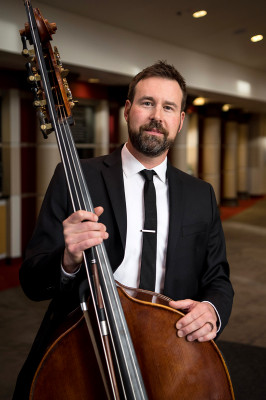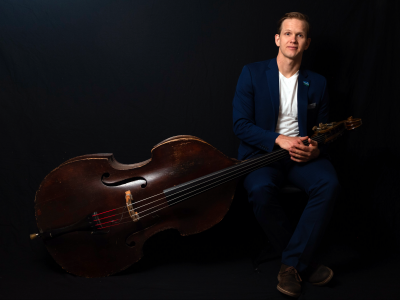Studio Overview
The double bass studio at Colorado State University is made up of a diverse group of undergraduate and graduate students from the state, the United States, and abroad. Double bass students represent every music major CSU offers, with many being double majors in areas such as engineering and various sciences as well. Additionally, many CSU bassists have been music minors or non-majors who have gone on to perform professionally in various capacities with music as a “second” career.
Double bassists at CSU are trained in a wide variety of performance styles, as bassists have the unique opportunity to work professionally in more genres than any other instrument. While all students receive rigorous classical training, each student is encouraged to pursue other musical styles, especially jazz. Students have the opportunity to perform in a number of CSU ensembles, including symphony, chamber orchestra, opera orchestra, wind ensemble, symphonic band, jazz big bands, and jazz combos. Many students also take advantage of performing in the flourishing Northern Colo. music scene, from jazz and classical to Ska and Bluegrass.
The mantra of the double bass studio is simply “work hard and have a great attitude!” We are a tight group working in a family atmosphere who pushes each other to improve each and every day, and are proud of the tradition of bass excellence at CSU — recently, many bassists have won CSU awards for academic and performance excellence!
Teaching Philosophy
As a diverse and exceptionally busy professional himself, Dr. Greenough believes in teaching students a diverse skillset that will allow them to take advantage of many different opportunities as a professional. Whether your goals are more specific or more general, to be a working professional in today’s market, a bassist must be able to play a wide range of styles at a high level. Even if you are primarily a classical performer, having the understanding of many styles not only improves your musicianship, but will allow you to pursue more performance opportunities as a professional. It is Dr. Greenough’s goal to develop students into functional professionals who have the skills necessary to work in today’s ever-changing music market.
First and foremost, Dr. Greenough is dedicated to helping each student develop the best physical relationship with his or her instrument possible. Instrument and physical setup issues are very unique to the double bass due to the many variables in size and shape for both the instrument and the player. Developing the most physically advantageous and ergonomic relationship with your instrument is not only important for musicianship, but also for long term physical health. Additionally, Dr. Greenough works with students to build comprehensive shoulder and core strength to prevent injury with an exercise plan developed in conjunction with the region’s leading sports rehabilitation therapists.
Dr. Greenough believes in the uniqueness of each and every student—everyone naturally has different strengths and challenges. While each student progresses through standard repertoire including solo music, orchestral excerpts, etc., the curriculum for each student is adapted to address the most needed areas first. For all students, emphasis is placed on developing strong intonation habits (through use of drone practice, scales, etc.) and developing a consistent practice routine to build stamina and dexterity. Students study from all areas of historic and modern double bass technique, from Simandl to Rabbath—while every player needs to be able to execute passage work and play musically, one student may have a better aptitude for pivot fingerings, while another may be more naturally equipped for finger extensions, for example.
Finally, above all is the consistent focus on creating music, with the understanding that everything we do is in service to music as an art. We are not merely learning to play the double bass, we are learning to create music of the highest artistic caliber. Dr. Greenough will help you to develop your unique musical voice, with the ability to make solid musical and phrasing decisions based on the history and structure of what you are performing—playing with a nice sound is one aspect, but truly performing from a musically informed perspective is another.
Study With
Audition Requirements
Bachelor of Music, Performance
- A standard etude selected from Simandl: 30 Studies (or comparable)
- Two contrasting movements from a standard solo, sonata or concerto
- An orchestral excerpt of the applicant’s choice from any Brahms, Beethoven, or Mozart symphony
- Three major and three melodic minor scales of the applicant’s choice (three octaves)
Bachelor of Music, Music Education; and Bachelor of Music, Music Therapy
- One movement from a standard solo, concerto, or sonata
- Two major and two melodic minor scales of the applicant’s choice (three octaves)
Bachelor of Music, Composition
- One movement from a standard solo, concerto, or sonata
- Two major and two melodic minor scales of the applicant’s choice (three octaves)
- Prospective composition students will interview for admission to the composition degree at the end of their freshman year; students submit a portfolio of at least two compositions completed in the past five years during the interview.
Bachelor of Arts; and Minor in Music
- One movement from a standard solo, concerto, or sonata
- Two major and two melodic minor scales of the applicant’s choice (three octaves)
Master of Music, Performance Option
-
Two contrasting movements of a standard concerto and/or sonata
-
One movement of any solo Bach
-
The following orchestral excerpts: Beethoven 9 Recitative, Beethoven 5th Scherzo and Trio, Mozart 35 or 41 (last movement), and any Brahms Symphony of your choice
- Two scales—one major, one minor—three octaves (fast/slow)
Master of Music, Music Education Specialization and Master of Music, Music Therapy Specialization
- Two contrasting movements from a standard solo, sonata or concerto
-
An orchestral excerpt of the applicant’s choice from any Brahms, Beethoven, or Mozart Symphony
- Two scales—one major, one minor—three octaves (fast/slow)
Alumni News
To submit your good news, click here.
- William Cubin (B.M. ’10): Willy is an active blues bassist, and teaches music at Ferguson High School in Loveland, Colo.
- David Saccardi (B.M. ‘11): David is principal bass of the Cheyenne Symphony, assistant principal of the Greeley Philharmonic, and a section member of the Fort Collins Symphony. David is also the Director of Orchestras at Loveland High School in Loveland, Colo., as is an active clinician.
- Jason Rosenholtz-Witt (M.M. ’11): Jason is currently pursuing his Ph.D in musicology at the prestigious Bienen School of Music at Northwestern University. Prior to leaving Colo., Jason was assistant principal bass of the Cheyenne Symphony, section bassist in the Fort Collins Symphony, and a very active freelance performer. He also was one of the most sought after private bass teachers in the region.
- Zach Schwartz (B.A. ’12): Zach is currently in medical school following his dream of being a physician.
- Brandon Katz (B.M. ’10, MM ’12): Brandon is an active performer and teaches many different instruments privately. He is currently the music teacher at Timberline PK-8 in Longmont, Colo.
- Daniel Smith (M.M. ’13): Daniel is an active freelance jazz, classical, and electric bassist throughout Colorado. He is orchestra director at Lucile Erwin Middle School in Loveland, Colo.
- Kenny Jones (MM ’13): Kenny is a busy freelance classical, jazz, and bluegrass performer and recording artist in the region. He also teaches many young bassists in Northern Colo., and is active in the Dalcroze movement.
- Erik Deines (B.M. ’15): Erik is currently a double major in performance and physics and won a section position in the Greeley Philharmonic at the end of his junior year.
- Zach Bush (B.M. ’15): Zach is a junior double major in performance and education, and recently won a section position in the Cheyenne Symphony, and has attended the Marrowstone Music Festival.
- Drew Miller (B.M. ’15): Drew is a junior double major in performance and electrical engineering. Drew freelances professionally and has attended the Marrowstone Music Festival.



